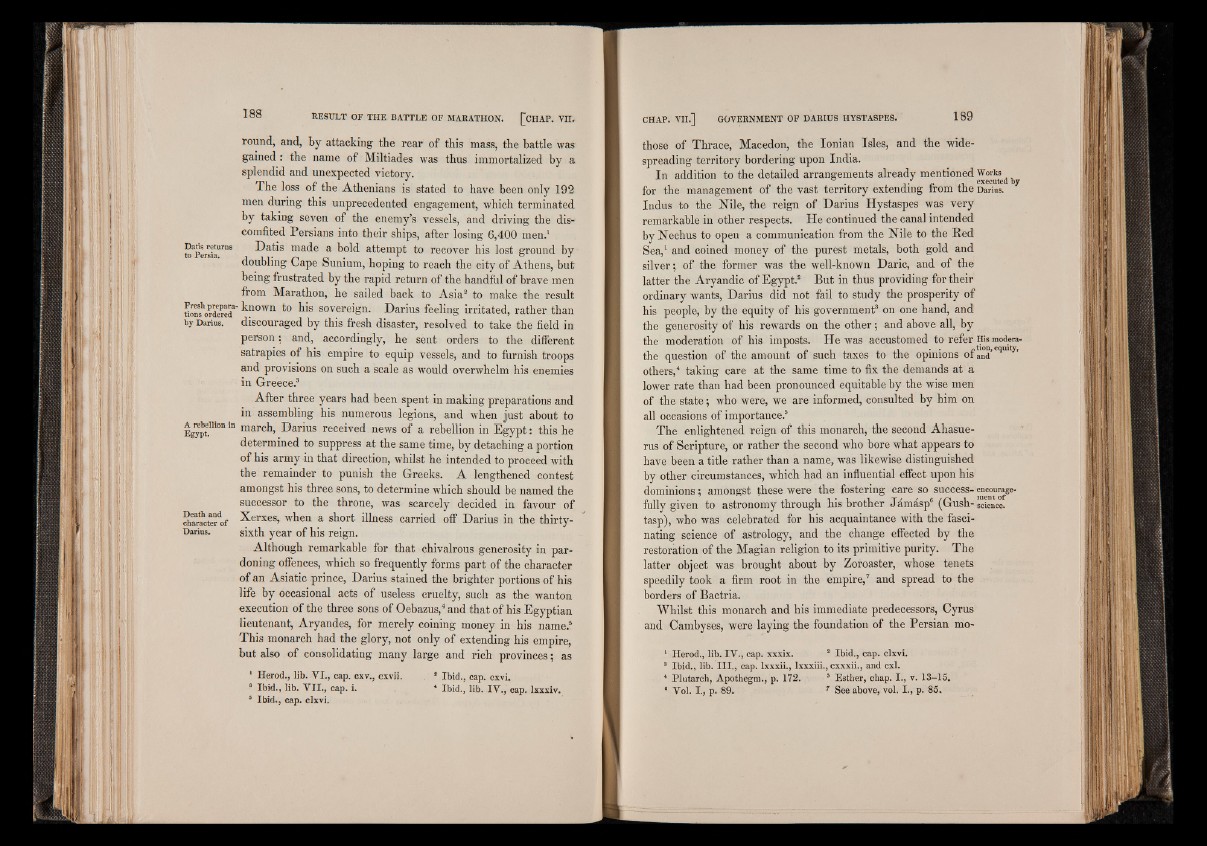
Datis returns
to Persia.
Fresh preparations
ordered
by Darius.
A rebellion in
Egypt.
Death and
character of
Darius.
round, and, by attacking tbe rear of this mass, the battle was
gained: the name of Miltiades was thus immortalized by a
splendid and unexpected victory.
The loss of the Athenians is stated to have been only 192
men during this unprecedented engagement, which terminated
by taking seven of the enemy’s vessels, and driving the discomfited
Persians into their ships, after losing 6,400 men.1
Datis made a bold attempt to recover his lost ground by
doubling Cape Sunium, hoping to reach the city of Athens, but
being frustrated by the rapid return of the handful of brave men
from Marathon, he sailed back to Asia8 to make the result
known to his sovereign. Darius feeling irritated, rather than
discouraged by this fi-esh disaster, resolved to take the field in
person; and, accordingly, he sent orders to the different
satrapies of his empire to equip vessels, and to furnish troops
and provisions on such a scale as would overwhelm his enemies
in Greece.3
After three years had been spent in making preparations and
in assembling his numerous legions, and when just about to
march, Darius received news of a rebellion in Egypt: this he
determined to suppress at the same time, by detaching a portion
of his army in that direction, whilst he intended to proceed with
the remainder to punish the Greeks. A lengthened contest
amongst his three sons, to determine which should be named the
successor to the throne, was scarcely decided in favour of
Xerxes, when a short illness carried off Darius in the thirty-
sixth year of his reign.
Although remarkable for that chivalrous generosity in pardoning
offences, which so frequently forms part of the character
of an Asiatic prince, Darius stained the brighter portions of his
life by occasional acts of useless cruelty, such as the wanton
execution of the three sons of Oebazus,4 and that of his Egyptian
lieutenant, Aryandes, for merely coining money in his name.5
This monarch had the glory, not only of extending his empire,
but also of consolidating many large and rich provinces; as
1 Herod., lib. V I., cap. cxv., cxvii. ! Ibid., cap. cxvi.
8 Ibid., lib. V I I ., cap. i. , 4 Ibid., lib. IV ., cap. lxxxiv.
‘ Ibid., cap. clxvi.
those of Thrace, Macedon, the Ionian Isles, and the wide-
spreading territory bordering upon India.
In addition to the detailed arrangements already mentioned ^
for the management of the vast territory extending from the Darius.
Indus to the Nile, the reign of Darius Hystaspes was very
remarkable in other respects. He continued the canal intended
by Nechus to open a communication from the Nile to the Red
Sea,1 and coined money of the purest metals, both gold and
silver; of the former was the well-known Daric, and of the
latter the Aryandic of Egypt.2 But in thus providing for their
ordinary wants, Darius did not fail to study the prosperity of
his people, by the equity of his government3 on one hand, and
the generosity of his rewards on the other; and above all, by
the moderation of his imposts. He was accustomed to refer His moderan
t n i s i ii • • «tion, equity, the question of the amount 01 such taxes to the opinions 01 and
others,4 taking care at the same time to fix the demands at a
lower rate than had been pronounced equitable by the wise men
of the state; who were, we are informed, consulted by him on
all occasions of importance.5
The enlightened reign of this monarch, the second Ahasue-
rus of Scripture, or rather the second who bore what appears to
have been a title rather than a name, was likewise distinguished
by other circumstances, which had an influential effect upon his
dominions; amongst these were the fostering care so success- encourage-
fully given to astronomy through his brother Jamasp6 (Gush- science,
tasp), who was celebrated for his acquaintance with the fascinating
science of astrology, and the change effected by the
restoration of the Magian religion to its primitive purity. The
latter object was brought about by Zoroaster, whose tenets
speedily took a firm root in the empire,7 and spread to the
borders of Bactria.
Whilst this monarch and his immediate predecessors, Cyrus
and Cambyses, were laying the foundation of the Persian mo-
1 Herod,, lib. IV ., cap. xxxix. 2 Ibid., cap. clxvi.
s Ibid., lib. I I I ., cap. lxxxii., Ixxxiii., cxxxii., and cxl.
4 Plutarch, Apothegm., p. 172. 5 Esther, chap. I., v. 13-15.
" Vol. If, p. 89. 7 See above, vol. I ., p. 85.